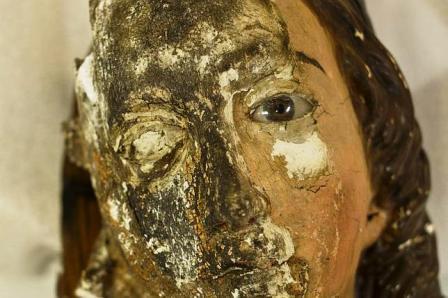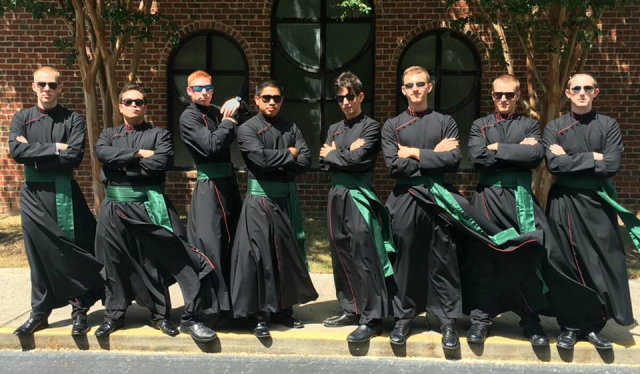Let’s have a look at the Collect for the upcoming Sunday in the TLM – 1962 Missale Romanum.
This Collect has been in use at least since the time of the Liber Sacramentorum Gellonensis, which is a variation of the ancient Gregorian Sacramentary. It survived the Novus Ordo cutter-snippers as the Collect for the 5th Sunday of Ordinary Time.
COLLECT (1962MR)
Familiam tuam, quaesumus, Domine, continua pietate custodi: ut a cunctis adversitatibus, te protegente, sit libera; et bonis actibus tuo nomini sit devota.
The first part was used almost like a template in other prayers, as in the Collect of the 5th Sunday after Epiphany: “Familiam tuam, quaesumus, Domine, continua pietate custodi, ut, quae in sola spe gratiae caelestis innititur, tua semper protectione muniatur.” Note not only the similar beginning, but also a connection in the vocabulary with that form of protego. This suggests to me that the prayers are related.
That word familia, though it seems so familiar, should have some attention. Familia and forms of famulus occur often in our prayers. Think of the line in the Roman Canon including “Memento, Domine, famulorum, famularumque tuarum… Be mindful, O Lord, of Your household servants and handmaids”. These words look like “family”, as does familia, and that is often appropriate depending on the context. However, the core meaning of the root of the word, fama, which comes from Latin’s ancient cousin Oscan must guide our minds to the whole body of people in an ancient household, including especially the servants. The different words for “family” in Latin include all the servants and staff, with the extended family, not just the core. The paterfamilias, “father of the family” had virtual power of life and death over most of his household and his word was law.
 Custodio, common in military language, means “to watch, protect, keep, defend, guard”. Pietas is complicated, as we have seen many times. Obvious English “piety” comes from this, but the Latin is more involved. Your Lewis & Short Dictionary, oddly cheap considering its usefulness, says pietas is “dutiful conduct toward the gods, one’s parents, relatives, benefactors, country, etc., sense of duty.” The classic application of pietas and the adjective pius is to the figure of Aeneas in the Latin poet Virgil’s Aeneid. As Troy was being destroyed by the Greeks after the incident with the wooden horse, Virgil (+A.D. 19) has Aeneas carry his elderly father Anchises from the wreckage of the burning city while leading his little son along by hand. This image of the man with his father on his back and his son by the hand perfectly expresses the duties Aeneas, future founder of what will become Rome, had toward his family, his pietas. He was also scrupulous in relation to the gods. So he is usually called pius Aeneas, which as you now know is far more complicated than the mere “pious Aeneas”.
Custodio, common in military language, means “to watch, protect, keep, defend, guard”. Pietas is complicated, as we have seen many times. Obvious English “piety” comes from this, but the Latin is more involved. Your Lewis & Short Dictionary, oddly cheap considering its usefulness, says pietas is “dutiful conduct toward the gods, one’s parents, relatives, benefactors, country, etc., sense of duty.” The classic application of pietas and the adjective pius is to the figure of Aeneas in the Latin poet Virgil’s Aeneid. As Troy was being destroyed by the Greeks after the incident with the wooden horse, Virgil (+A.D. 19) has Aeneas carry his elderly father Anchises from the wreckage of the burning city while leading his little son along by hand. This image of the man with his father on his back and his son by the hand perfectly expresses the duties Aeneas, future founder of what will become Rome, had toward his family, his pietas. He was also scrupulous in relation to the gods. So he is usually called pius Aeneas, which as you now know is far more complicated than the mere “pious Aeneas”.
Christians adapted ancient terms like this to a new context, to express new meanings. In Jerome’s Vulgate in both Old and New Testament pietas is “conscientiousness, scrupulousness regarding love and duty toward God.” You see that the core of pietas remains “duty.” Pietas is also one of the seven gifts of the Holy Spirit (cf. CCC 733-36; Isaiah 11:2), by which we are duly affectionate and grateful toward our parents, relatives and country, as well as to all men living insofar as they belong to God or are godly, and especially to the saints. In loose or common parlance, “piety” indicates fulfilling the duties of religion. Sometimes “pious” is even used in a negative way, as when people take aim at external displays of religious dutifulness as opposed to what they is “genuine” practice (cf. Luke 18:9-14).
All this is involved when we use pietas to describe ourselves, what human beings have regarding, God, family, country, etc. But in our prayer today, we are asking God to guard us with His pietas. When we speak of the pietas of God, we are generally referring to His mercy toward us. While it is not strictly right to imply that God has a duty toward us, He has made promises and God is true to His promises. We can depend on Him not because He is obliged by pietas, as we are, but because He is loving and merciful. So, God’s pietas towards us has a different tone altogether.
I note as well that in that line from the Canon I quoted above in respect to familia, down the line a bit, we come to the Latin word devotio. We have a form of that word in today’s Collect. There must be a connection between the concepts of familia, pietas and devota, an adjective connected with familia.
Your L&S reveals that devoto “to dedicate, devote” as well as “to bewitch, enchant” and, in a related sense, “to invoke with vows”, and by logical extension it comes to mean “to curse”, though clearly today’s use doesn’t bear that connotation. In the French source for liturgical Latin we call Blaise/Dumas, we find that the adjective devotus, a, um has a specially connection to devotion to service of the Lord. We can also draw insight into what is really being said here by bringing in the force of devotio, an obvious derivative. In classical usage devotio is “fealty, allegiance, devotedness; piety, devotion, zeal.” Devotio also means, as devoto implied, “a cursing, curse, imprecation, execration, a magical formula, incantation, spell.” Again, that is not our direction today. Briefly, I hear devotio as “a devotion to duty”. In that sense it picks up the meaning of pietas. Our “devotion” leads us to keep God’s commandments and attend with focus to the duties of our state before all else. If we are truly devout, pious, in respect to God, devoted to fulfilling the duties of our state in life truly is here and now, then God will give us every actual grace we need to fulfill our vocations. We are, in effect, fulfilling our proper role in His great plan and thus He is sure to help us. God fulfills what He promises to us as we do our part in His plan in which He gave us a role from before the creation of the universe.
ICEL (1973 translation of the 1970MR):
Father,
watch over your family
and keep us safe in your care,
for all our hope is in you.
LITERAL TRANSLATION:
Guard your family, we beseech you, O Lord, with continual mercy, so that that (family) may be free from all adversities as You are protecting it, and in good acts may be devoted in Your Name.
This prayer speaks first of all to how interconnected we are as Catholic Christians. By baptism, we are the adopted children of the Father. We look to Him with the reverence of children, not merely as cowering slaves. We belong to a family. In the arc of our lives we have roles and states to fulfill. Within the Church we have our manner of participation. We are all in this together. My strengths support yours. My sins weaken us all. My defeats become your concern. All our triumphs are shared as we raise them up to God. In remembering our common bonds with each other in the Father, we must also remember a profound inequality in our bonds – children are no less members of the family than parents, but they are dependent they are not the equals of their parents. God is not our peer. We are not His equal. We are all children before His gaze.
I am amused and horrified when I hear modernists, progressivist types suggest that modern man is all grown up now and that we no longer have to kneel as if cowering before a stern master God.
Our prayer gives us an image that runs very much contrary to the prevailing values of the last few decades, a period in which the family as a coherent recognizable unit has been systematically broken down.
Our Latin prayers often reflect the Church’s profound awareness of our lack of equality with God.
The prayers are radically hierarchical, just as God’s design reveals hierarchy and order.
The prayers are imbued with reverence.
Compare this attitude with prevailing societal norms (and the old ICEL prayers).



 Custodio, common in military language, means “to watch, protect, keep, defend, guard”. Pietas is complicated, as we have seen many times. Obvious English “piety” comes from this, but the Latin is more involved. Your Lewis & Short Dictionary, oddly cheap considering its usefulness, says pietas is “dutiful conduct toward the gods, one’s parents, relatives, benefactors, country, etc., sense of duty.” The classic application of pietas and the adjective pius is to the figure of Aeneas in the Latin poet Virgil’s Aeneid. As Troy was being destroyed by the Greeks after the incident with the wooden horse, Virgil (+A.D. 19) has Aeneas carry his elderly father Anchises from the wreckage of the burning city while leading his little son along by hand. This image of the man with his father on his back and his son by the hand perfectly expresses the duties Aeneas, future founder of what will become Rome, had toward his family, his pietas. He was also scrupulous in relation to the gods. So he is usually called pius Aeneas, which as you now know is far more complicated than the mere “pious Aeneas”.
Custodio, common in military language, means “to watch, protect, keep, defend, guard”. Pietas is complicated, as we have seen many times. Obvious English “piety” comes from this, but the Latin is more involved. Your Lewis & Short Dictionary, oddly cheap considering its usefulness, says pietas is “dutiful conduct toward the gods, one’s parents, relatives, benefactors, country, etc., sense of duty.” The classic application of pietas and the adjective pius is to the figure of Aeneas in the Latin poet Virgil’s Aeneid. As Troy was being destroyed by the Greeks after the incident with the wooden horse, Virgil (+A.D. 19) has Aeneas carry his elderly father Anchises from the wreckage of the burning city while leading his little son along by hand. This image of the man with his father on his back and his son by the hand perfectly expresses the duties Aeneas, future founder of what will become Rome, had toward his family, his pietas. He was also scrupulous in relation to the gods. So he is usually called pius Aeneas, which as you now know is far more complicated than the mere “pious Aeneas”.






















 St. John Paul II wrote in his 2002 Apostolic Letter on the Rosary, Rosarium Virginis Mariae:
St. John Paul II wrote in his 2002 Apostolic Letter on the Rosary, Rosarium Virginis Mariae:


 Another miracle occurred that day. As the Battle raged, St. Pius V in Rome had a vision of the victory while he was visiting the headquarters of the Domincans on the Aventine Hill at Santa Sabina. The messenger bringing news of the victory would arrive a couple weeks later. You can visit the room where Pius received the message.
Another miracle occurred that day. As the Battle raged, St. Pius V in Rome had a vision of the victory while he was visiting the headquarters of the Domincans on the Aventine Hill at Santa Sabina. The messenger bringing news of the victory would arrive a couple weeks later. You can visit the room where Pius received the message.

 From a reader in the Diocese of Charlotte, in North Carolina.
From a reader in the Diocese of Charlotte, in North Carolina.








 re radical attention... What has also contributed greatly to the situation is an exaltation of the virtue of tolerance which is falsely seen as the virtue which governs all other virtues. In other words, we should tolerate other people in their immoral actions to the extent that we seem also to accept the moral wrong. Tolerance is a virtue, but it is certainly not the principal virtue; the principal virtue is charity... Charity means speaking the truth. I have encountered it (not speaking the truth) many times myself as a priest and bishop. It is something we simply need to address. There is far too much silence — people do not want to talk about it because the topic is not 'politically correct.' But we cannot be silent any longer."
re radical attention... What has also contributed greatly to the situation is an exaltation of the virtue of tolerance which is falsely seen as the virtue which governs all other virtues. In other words, we should tolerate other people in their immoral actions to the extent that we seem also to accept the moral wrong. Tolerance is a virtue, but it is certainly not the principal virtue; the principal virtue is charity... Charity means speaking the truth. I have encountered it (not speaking the truth) many times myself as a priest and bishop. It is something we simply need to address. There is far too much silence — people do not want to talk about it because the topic is not 'politically correct.' But we cannot be silent any longer." 



 020 8133 4535
020 8133 4535




















